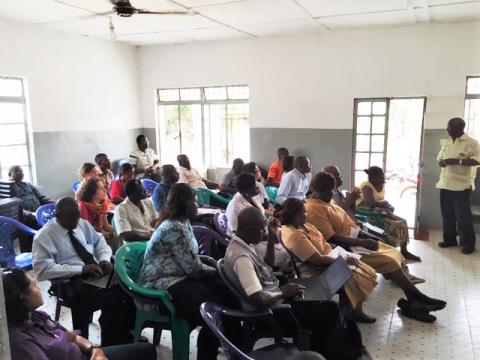
At a briefing to the United Nations General Assembly in New York on 13 January 2016, WHO Director-General Dr. Margaret Chan proudly announced ‘the end’ of the Ebola crisis – i.e., no new cases in the three most affected countries – by declaring that “the many steps taken at national and international levels have had a decisive impact. No one will let this virus take off and run away again”.
In order to keep the virus ‘on a tight leash’, it is not surprising, however, that Sierra Leone’s current health reform efforts are heavily focused on not only drawing lessons learnt from the crisis response itself, but also, and above all, looking at the pre-existing system constraints and vulnerabilities which had led to this crisis.
A recently finalized review of the National Health Sector Strategic Plan (NHSSP) 2010-15, commissioned by the Sierra Leone Ministry of Health and Sanitation (MOHS) and funded and supported by the EU-Luxembourg-WHO Universal Health Coverage Partnership (UHC-P), is a crucial step towards laying the foundations for a more resilient and functional health system in Sierra Leone.
The review builds on the principle that “any new strategic plan development process needs to be informed by the achievements and the challenges of the 2010-2015 NHSSP. This calls for the review of the strengths and weaknesses of the implementation of the Strategic plan, as well as its health systems, against the effects of the recent Ebola epidemic and the Health Sector Recovery Plan” (review report, p. 39).
By assessing the country’s performance according to WHO’s six health system pillars (service delivery, health workforce, information, medicines, financing and governance), the review provides decision-makers and development partners with key recommendations by building block, which will feed into the elaboration of a new five-year National Health Sector Strategic Plan (NHSSP II 2016-2020) – a process that will also be supported by the UHC-P.
Ten overarching recommendations emerged from the review, which are to be addressed in the coming two years (2016 – 2017):
1. Strengthen leadership and management capacity (leadership training) as a matter of urgency
2. Align the NHSSP II with the objectives and activities of the Health Sector Recovery Plan
3. Set realistic targets and priorities for NHSSP II, based on known available resources
4. Improve working relations between the Ministry of Health and the Ministry of Finance, as well as between the Ministry of Education and the Ministry of local and rural development
5. Bring development partners “on plan” and involve them in the drafting of next NHSSP
6. Review the performance and functions of the community health centre (CHC) and the distribution of Health Financing nationwide
7. Align the ‘vertical programs’ to the new NHSSP II and develop one procurement plan and one supply system for all programs
8. Prepare for the transfer of payrolls of staff to district levels (appoint HR managers in District Health Management Teams [DHMT])
9. Restructure and strengthen the health care financing unit
10. Expand electronic reporting to all DHMT and CHCs.
A next step for Sierra Leone as a UHC-P partner country will also be to review the programme’s Phase III roadmap according to these new priorities, namely by putting a greater emphasis on the role of districts and the need to strengthen their capacities.
After all, according to Dr Samuel Kargbo, Director of Health Systems Policy, Planning and Information at the MOHS, this work is about joining forces in order to build “a functional and resilient health system [,which] takes time and requires long-term commitment from the international community”.
